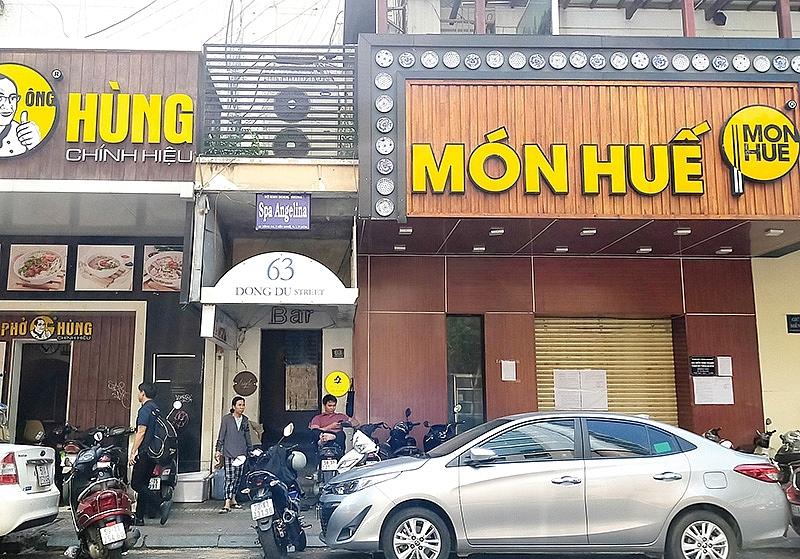 |
| Almost all Mon Hue restaurants closed their doors in November last year Photo: Le Toan |
Vietnam’s soy beverage startup Soya Garden has closed 28 out of its 50 stores nationwide after bearing great losses during COVID-19.
Hoang Anh Tuan, CEO of Soya Garden, originally targeted having 100 stores in 2019 and 300 this year as well as entering in South Korea, Thailand, and Japan. The company sought to make their drinks as popular as coffee or bubble tea, a goal which has come to nought due to the health crisis.
According to a representative of Egroup – which poured over VND100 billion ($43.47 million) into the chain, the closure is to restructure its operation and remove ineffective stores.
Soya Garden went into great expense to open a great number of stores in a short time. However, this kind of drink, described as both old and as a familiar product in a modern form, failed to gather a sizable local following, leading to the closure of inefficient stores to save costs.
However, according to Tran Bang Viet, CEO of Dong A Solutions, a provider of corporate solutions, the reason behind the failure is that the chain’s founder only focused on expanding the network while not paying appropriate attention to local taste and demand.
“Founders will succeed if they calculate carefully the number of stores in the chain based on their management and financial capacity,” Viet told VIR. “However, numerous founders’ impatience in extending chains following a commitment to investors, in collaboration with the ease of calling for investment capital and weak management capacity, are factors that bring chains to the brink of bankruptcy very quickly.”
Trading in food and beverages tends to be more risky than other sectors because the sector suffers from the impact of differing regional tastes, and it is also difficult to preserve material over a long period of time. High rent for retail premises is also a core factor behind the collapse of chains.
“At Soya Garden in particular, it decided to focus on a niche market. It is unfortunate that the payment capacity and purchasing power of the target customers was not enough to offset the expenditures on land and branding,” Viet added.
Previously, RuNam Bistro, operated by Niso Corporation which owns well-known restaurants like RuNam Boutique, Fly Cupcake, iBox Café, CIAO Café, and The KAfe chain, also closed some of its stores due to financial difficulties and development strategies.
Gloria Jean’s Coffee, meanwhile, is a big chain that has made a presence in 39 countries and opened over 1,000 shops. However, in Vietnam, it simply suffered the same fate as The KAfe, which suffered from collapse a few years ago due to a lack of proper strategy and even capital.
The failure of startups does not only come from impatience in extending the chain and weakness in operating systems, but also the actual use of investment capital.
For instance, The KAfe succeeded in mobilising $5.5 million from investment funds, but it failed to use the capital effectively.
In another case, recently, MF Holding Inc., Gifted Wisdom Ltd., Harvest Investment Advisory Co., Ltd., and Fenghe Harvest Ltd., submitted a lawsuit against Huy Nhat for alleged fraud and the appropriation of $25 million through a made-up real estate development project in the Lang Co tourist area in the central province of Thua Thien-Hue.
Huy Nhat is the founder of Huy Vietnam, which was caught up in scandal for closing down the Mon Hue restaurant chain.
According to a report from the investors, Nhat established companies to mobilise money from foreign investors to develop a real estate project. He then drew up a complete investment plan to lure them in, and affirmed that he would only use capital to develop a project in Lang Co. However, in reality, that venture was never intended and the names of investors were not mentioned in the business registration licence of the company that they committed to becoming shareholders in.
Last October, the Vietnamese media reported that Nhat’s Mon Hue restaurant system became insolvent. The four foreign investors tried to contact Huy Nhat in vain. After checking the balance of the bank account of Horizon Vietnam – the company owned by Nhat to develop the project in Thua Thien-Hue, they found that less than VND300 million ($13,000) of $25 million remained.
Pham Thanh Hung, vice chairman of property developer Cengroup – one of the “sharks” on startup TV show Shark Tank Vietnam – said that numerous founders of startups use investors’ money with the wrong purpose compared to the initial commitment, and even to pay previous debts. Several founders drew massive expenditures for their projects, causing problems from the outset.
While startups focus on the growth potential of their products, businesses commonly target profitability. More telling is that many businesses masquarade as startups to win the hearts of investors and receive more capital.
Meanwhile, startups usually fall short in proving their ability, according to Nguyen Hoa Binh, chairman of NextTech. NextTech has invested in many startups like ride-hailing platform FastGo and online shopping platform PushSale.
“By proving their profitability through for example expanding scale, fake startups can easily get more investment,” said Binh.
Echoing this, Hajime Hotta, chief AI scientist at Nexus FrontierTech told VIR, “Despite having no particular business ideas, they (fake startups) still draw more benefits than actual, honest startups. This has been quite common.” VIR
Kim Anh

Online food purchases predicted to rule the roost post-pandemic
The online food and grocery delivery segment has gained remarkable momentum after multiple platforms launched services for those stuck at home during social distancing.

Vietnamese start-ups continue to pull in investment
Investment in Vietnamese start-ups is growing sharply with millions of dollars pledged in 2019 and the first two months of 2020, according to Singaporean venture capital firm Cento Ventures.